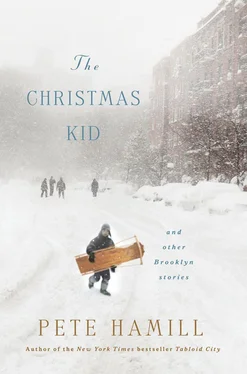Jabbo thought about this, and then stepped out of the car. Harry did, too, carrying the flight bag. They could smell the sea, and hear the ding-dinging of buoys, and see the skyline to the right and the lights of Staten Island and Jersey beyond. They walked to the end of the pier. The water was black and glossy. There was no moon.
“I’ve been seeing Mary Larkin,” Harry said, counting pilings at the end of the pier. “She’d divorced, you know. Kids grown up. We get this score, Jabbo, me and her are gonna go south. Orlando, St. Pete. I’ll have a grubstake, maybe buy a car, a 7-Eleven, something like that. Hell, fifty grand then must be worth three hundred G s today.” He stopped at the seventh piling. “This is the one.”
“And?”
“All you gotta do is go down and get it.”
Jabbo shook his head, smiling thinly, as he looked down at the swirling black water, fifteen feet below the pier.
“I’m forty-nine years old, Harry,” he said. “I’m not what I was. How do I get back up? And what do I use to pry the box off the piling? Presuming the box is even there …It’s nuts, Harry. Let’s go get eggs.”
Harry opened the flight bag and removed a coil of heavy rope, a claw hammer, a face mask.
“I’ll give you half,” he said.
Jabbo looked at the rope and tools, walked to the edge of the pier, gazed off at the black harbor. Then he started unbuttoning his coat. “What the hell,” he said. He tied one end of the rope around a piling. Five minutes later, barefoot, masked, the hammer in hand, Jabbo stood at the edge of the pier. “See ya,” he said, and went over.
Harry stared at the roiled water, held his breath as if in sympathy, then saw Jabbo’s head come up, gasping for breath. Jabbo gulped, his legs shimmering and pale in the blackness, then bent over and dived again. When he came up again for air, he was fifteen feet away from the pier. A tide was running. He bent and dove, and this time was under a long time. Harry banged his hands together, tense and cold. There was no sign of Jabbo. Impossible. He couldn’t be under this long.
And then he saw him, maybe forty feet out, shouting something Harry couldn’t understand, just his head bobbing in the water, receding, going out. The tide was ripping along now. And then above Jabbo’s head, he saw the box. Jabbo waved it once. Then he was gone.
“Jabbo!” Harry shouted. And then screamed: “Jabbo!” He heard nothing but the dinging of the buoys and the tide slapping against the pilings, and the distant moaning of a foghorn. And he thought: I’ve got to get out of here. I’ve got to go to the palm trees and the sun. He looked one last time at the harbor, which was as flat and black and final as death, and then he began to run.
WHETHER HE WAS AWAKE or asleep, the New York craziness never left Hirsch alone. Sometimes he tried to tell his wife, Margaret, about his dreams — the dark roaring tunnels, the gleaming yellow eyes of the leopard perched in the backyard tree, the baby with the metal tongue who never stopped screaming. She would always cut him off. “Hirsch,” she would say. “Calm down. You’re letting it get to you, Hirsch. You’re sounding paranoid, Hirsch.”
“Yes,” Hirsch would say. “But I do have enemies.”
Waking, a mask of calm pasted to his face, Hirsch would leave for the advertising agency promptly each morning at nine. He no longer took the subway from Brooklyn Heights. Junkies waited in the doorways near the station, he thought, and the subway was itself a brutal morning assault, an iron purgatory jammed with knife artists, hammer swingers, lobotomized crazies. They, too, inhabited his dreams, spraying paint down his throat, ramming switchblades into his heart, slicing him with smiles on their faces. Them. He was afraid of Them. Blacks and whites, people speaking mysterious languages, young men with eyes full of ancient evil: Them . Now Hirsch drove a car. A dark blue Oldsmobile. In a car, he wouldn’t have to deal with Them.
Except that on this rainy Brooklyn morning, the car was gone.
“They’ve stolen the car,” he said, coming back up the stoop of the brownstone, his eyes wild: “They took the car!”
Margaret calmed Hirsch and called the police. Then she arranged for a car service to pick him up and take him across the bridge to work. Hirsch waited inside the vestibule for the car, seeing killers and marauders walking down his street. They don’t work, he thought; they patrol. They come around like rats, seeking weakness and vulnerability, and then they strike. I should have a gun. I should be able to shoot all of them.
There were two policemen in the reception room of the advertising agency when Hirsch arrived with his coffee and danish. Someone had broken into the office during the night and stolen two IBM Selectrics. The cops looked weary as they made notes in spiral pads.
“They wrecked the Xerox machine, too,” said Ruthie, the receptionist. “Just poured rubber cement into it and ruined it. Can you imagine?”
“Yes,” Hirsch said. “I can imagine.”
Hirsch went into his office and sat at his desk. One of his desk drawers was open. Suddenly, Hirsch was afraid, as if one of the intruders might still be watching, examining his courage from a distance. They had been here, a gang of Them, invaders from the darkness, and they had rummaged through this small part of the world that was his. Hirsch hurried out to tell the cops. They were gone.
“You mean they didn’t take fingerprints or anything?” Hirsch asked. Ruthie laughed. “Come on, Mr. Hirsch. They don’t do stuff like that anymore.” She powdered her nose. “They just fill out the forms for the insurance company.”
That was typical. The craziness was now general. Thievery, robbery, violence; knives, guns, blood, and pain. They were as natural now as breathing. He examined his desk. Nothing had been taken except a cheap old onyx-handled letter opener his wife had bought for him during their honeymoon in Acapulco in 1958. Of course. If they could, they would steal only the small things that you loved. Hirsch was very still for a long time, and then worked through the morning in a gray fog, trying to infuse his copy with images of joy and romance. His wife called to say that all the forms had been filled out about the stolen car. Hirsch ate lunch at his desk, then napped on his couch.
Again, he saw the leopard in the garden, its eyes the color of typhoid. The baby with the metal tongue screamed in a higher pitch. He saw gray horses leaping from a pier and a woman in a white dress on the deck of a boat receding into a dark sea. He awoke with chills.
The afternoon was a blur. He went home at four, another car service picking him up at the curb, outside his office. When he got to Brooklyn Heights, he froze.
The blue Oldsmobile was parked across the street from his house.
Hirsch paid the car service and felt his heart twitching. He went over to his car, walking around it as if it were booby-trapped. No dents. No graffiti. But there was an envelope stuck to the steering wheel. Scrawled on the outside were the words: “To the Owner.”
Cautiously, Hirsch unlocked the door and opened the envelope. It contained two theater tickets to Dreamgirls and a typed note.
To the owner of this car:
Please forgive me. Last night I was desperate. My mother was rushed to the hospital in New Jersey. She was dying. I tried to get a taxi to take me to Jersey, but none would take me. That’s New York. It was too late for the bus. So I helped myself to your car. I know this is a crime. But I was desperate. I also know that I must have caused you great inconvenience and anger. To make this up to you, I’ve bought these tickets for you. I hope you enjoy the show. It’s the only way I can think of to make this up to you.
Читать дальше












